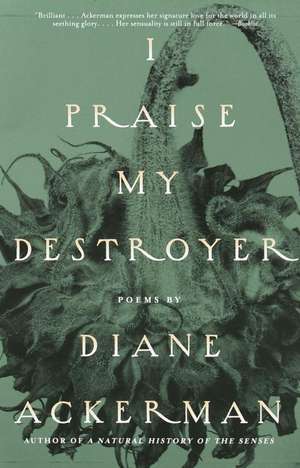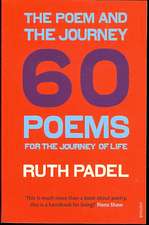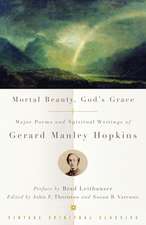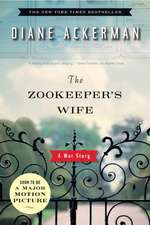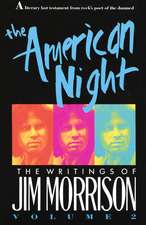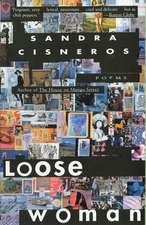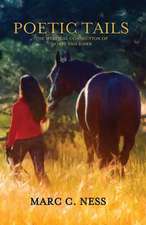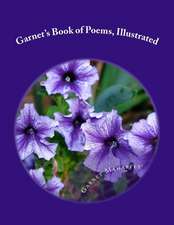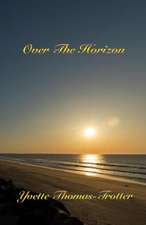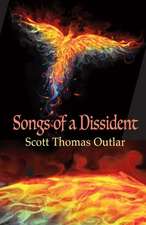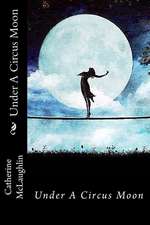I Praise My Destroyer: Poems
Autor Diane Ackermanen Limba Engleză Paperback – 31 iul 2000
Imbued with ravishing imagery, these exuberant and lyrical explorations of aging, longing, and death demonstrate Ackerman's full engagement with every aspect of life's process. Ackerman muses on the confines of therapy sessions, where she intersects "twice a week/in a painstaking hide-and-seek/making do with half-light, half-speak"; relishes the succulent pleasure of eating an apricot, with its "gush of taboo sweetness"; and imagines the "unupholstered voice, a life in outline" in her stunning elegy to C. S. Lewis. Whimsical, organic, and wise, the poems in I Praise My Destroyer affirm Ackerman's place as one of the most enchanting poets writing today.
Preț: 83.12 lei
Nou
Puncte Express: 125
Preț estimativ în valută:
15.91€ • 16.51$ • 13.26£
15.91€ • 16.51$ • 13.26£
Carte disponibilă
Livrare economică 01-15 martie
Preluare comenzi: 021 569.72.76
Specificații
ISBN-13: 9780679771340
ISBN-10: 0679771344
Pagini: 132
Dimensiuni: 133 x 202 x 10 mm
Greutate: 0.16 kg
Editura: Vintage Publishing
ISBN-10: 0679771344
Pagini: 132
Dimensiuni: 133 x 202 x 10 mm
Greutate: 0.16 kg
Editura: Vintage Publishing
Notă biografică
Diane Ackerman lives in upstate New york.
Extras
WE DIE
--for Carl Sagan
We die despite appointments and feuds,
while our toddler,
who recently learned to say No,
opens and shuts drawers
a hundred times a day
and our teen braces
for the rapids of romance.
We die despite the contracts
and business trips we planned,
when our desk is untidy,
despite a long list of things to do
which we keep simmering
like a pot of rich broth.
We die despite work we cherish,
marrying whom we love,
piling up a star-spangled fortune,
basking on the Riviera of fame,
and achieving, that human participle
with no known object.
Life is not fair, the old saw goes.
We know, we know, but the saw glides slow,
one faint rasp, and then at length another.
When you died, I felt its jagged teeth rip.
Small heartwounds opened and bled,
closing as new ones opened ahead.
Horror welled, not from the how but the when.
You died at the top of your career,
happy, blessed by love, still young.
Playing by evolution's rules, you won:
prospered, bred, rose in your tribe,
did what the parent gods and society prized.
Yet it didn't save you, love or dough.
Even when it happens slow, it happens fast,
and then there's no tomorrow.
Time topples, the castle of cards collapses,
thoughts melt, the subscription lapses.
What a waste of life we spend in asking,
in wish and worry and want and sorrow.
A tall man, you lie low, now and forever
complete, your brilliant star eclipsed.
I remember our meeting, many gabfests ago,
at a crossroads of moment and mind.
In later years, touched by nostalgia,
I teased: "I knew you when
you were just a badly combed scientist."
With a grin, you added: "I knew you when
you were just a fledgling poet."
Lost friend, you taught me lessons
I longed to learn, and this final one I've learned
against my will: the one spoken in silence,
warning us to love hard and deep,
clutch dear ones tighter, ransom each day,
the horror lesson I saw out of the corner of my eye
but refused to believe until now: we die.
WE DIE
--for Carl Sagan
We die despite appointments and feuds,
while our toddler,
who recently learned to say No,
opens and shuts drawers
a hundred times a day
and our teen braces
for the rapids of romance.
We die despite the contracts
and business trips we planned,
when our desk is untidy,
despite a long list of things to do
which we keep simmering
like a pot of rich broth.
We die despite work we cherish,
marrying whom we love,
piling up a star-spangled fortune,
basking on the Riviera of fame,
and achieving, that human participle
with no known object.
Life is not fair, the old saw goes.
We know, we know, but the saw glides slow,
one faint rasp, and then at length another.
When you died, I felt its jagged teeth rip.
Small heartwounds opened and bled,
closing as new ones opened ahead.
Horror welled, not from the how but the when.
You died at the top of your career,
happy, blessed by love, still young.
Playing by evolution's rules, you won:
prospered, bred, rose in your tribe,
did what the parent gods and society prized.
Yet it didn't save you, love or dough.
Even when it happens slow, it happens fast,
and then there's no tomorrow.
Time topples, the castle of cards collapses,
thoughts melt, the subscription lapses.
What a waste of life we spend in asking,
in wish and worry and want and sorrow.
A tall man, you lie low, now and forever
complete, your brilliant star eclipsed.
I remember our meeting, many gabfests ago,
at a crossroads of moment and mind.
In later years, touched by nostalgia,
I teased: "I knew you when
you were just a badly combed scientist."
With a grin, you added: "I knew you when
you were just a fledgling poet."
Lost friend, you taught me lessons
I longed to learn, and this final one I've learned
against my will: the one spoken in silence,
warning us to love hard and deep,
clutch dear ones tighter, ransom each day,
the horror lesson I saw out of the corner of my eye
but refused to believe until now: we die.
--for Carl Sagan
We die despite appointments and feuds,
while our toddler,
who recently learned to say No,
opens and shuts drawers
a hundred times a day
and our teen braces
for the rapids of romance.
We die despite the contracts
and business trips we planned,
when our desk is untidy,
despite a long list of things to do
which we keep simmering
like a pot of rich broth.
We die despite work we cherish,
marrying whom we love,
piling up a star-spangled fortune,
basking on the Riviera of fame,
and achieving, that human participle
with no known object.
Life is not fair, the old saw goes.
We know, we know, but the saw glides slow,
one faint rasp, and then at length another.
When you died, I felt its jagged teeth rip.
Small heartwounds opened and bled,
closing as new ones opened ahead.
Horror welled, not from the how but the when.
You died at the top of your career,
happy, blessed by love, still young.
Playing by evolution's rules, you won:
prospered, bred, rose in your tribe,
did what the parent gods and society prized.
Yet it didn't save you, love or dough.
Even when it happens slow, it happens fast,
and then there's no tomorrow.
Time topples, the castle of cards collapses,
thoughts melt, the subscription lapses.
What a waste of life we spend in asking,
in wish and worry and want and sorrow.
A tall man, you lie low, now and forever
complete, your brilliant star eclipsed.
I remember our meeting, many gabfests ago,
at a crossroads of moment and mind.
In later years, touched by nostalgia,
I teased: "I knew you when
you were just a badly combed scientist."
With a grin, you added: "I knew you when
you were just a fledgling poet."
Lost friend, you taught me lessons
I longed to learn, and this final one I've learned
against my will: the one spoken in silence,
warning us to love hard and deep,
clutch dear ones tighter, ransom each day,
the horror lesson I saw out of the corner of my eye
but refused to believe until now: we die.
WE DIE
--for Carl Sagan
We die despite appointments and feuds,
while our toddler,
who recently learned to say No,
opens and shuts drawers
a hundred times a day
and our teen braces
for the rapids of romance.
We die despite the contracts
and business trips we planned,
when our desk is untidy,
despite a long list of things to do
which we keep simmering
like a pot of rich broth.
We die despite work we cherish,
marrying whom we love,
piling up a star-spangled fortune,
basking on the Riviera of fame,
and achieving, that human participle
with no known object.
Life is not fair, the old saw goes.
We know, we know, but the saw glides slow,
one faint rasp, and then at length another.
When you died, I felt its jagged teeth rip.
Small heartwounds opened and bled,
closing as new ones opened ahead.
Horror welled, not from the how but the when.
You died at the top of your career,
happy, blessed by love, still young.
Playing by evolution's rules, you won:
prospered, bred, rose in your tribe,
did what the parent gods and society prized.
Yet it didn't save you, love or dough.
Even when it happens slow, it happens fast,
and then there's no tomorrow.
Time topples, the castle of cards collapses,
thoughts melt, the subscription lapses.
What a waste of life we spend in asking,
in wish and worry and want and sorrow.
A tall man, you lie low, now and forever
complete, your brilliant star eclipsed.
I remember our meeting, many gabfests ago,
at a crossroads of moment and mind.
In later years, touched by nostalgia,
I teased: "I knew you when
you were just a badly combed scientist."
With a grin, you added: "I knew you when
you were just a fledgling poet."
Lost friend, you taught me lessons
I longed to learn, and this final one I've learned
against my will: the one spoken in silence,
warning us to love hard and deep,
clutch dear ones tighter, ransom each day,
the horror lesson I saw out of the corner of my eye
but refused to believe until now: we die.
Recenzii
"Brilliant . . . Ackerman expresses her signature love for the world in all its seething glory. . . . Her sensuality is still in full force." --Booklist
"[These poems are] full of physical participation in the world, human involvement, and (as one might expect of this scholar of the senses) an eloquent eye." --Richard Wilbur
"Vivid, playful, abundant, these poems constitute a directory of colors, an assembly of weathers, waters, creatures, and a bold, brash, invincible vote of confidence." --Anthony Hecht
"[Ackerman's] poems express a sense of sheer joy in physical existence, which she explores in language that has its own intense life. The book is a pure pleasure." --Louis Simpson
"[These poems are] full of physical participation in the world, human involvement, and (as one might expect of this scholar of the senses) an eloquent eye." --Richard Wilbur
"Vivid, playful, abundant, these poems constitute a directory of colors, an assembly of weathers, waters, creatures, and a bold, brash, invincible vote of confidence." --Anthony Hecht
"[Ackerman's] poems express a sense of sheer joy in physical existence, which she explores in language that has its own intense life. The book is a pure pleasure." --Louis Simpson
Textul de pe ultima copertă
In her first new book of poetry since Jaguar of Sweet Laughter, Diane Ackerman combines her deep understanding of the world with her immense passion for language to craft richly sensual poems that "honor all life/wherever and in whatever form/it may deal".
Imbued with ravishing imagery, these exuberant and lyrical explorations of aging, longing, and death demonstrate Ackerman's full engagement with every aspect of life's process. The poet and naturalist muses on the confines of therapy sessions, where she interests "twice a week/in a painstaking hide-and-seek/making do with half-light, half-speak"; relishes the succulent pleasure of eating an apricot, with its "gush of taboo sweetness"; and imagines the "unupholstered voice, a life in outline" in her stunning elegy to C. S. Lewis. Whimsical, organic, and wise, the poems in I Praise My Destroyer affirm Ackerman's place as one of the most enchanting poets writing today.
